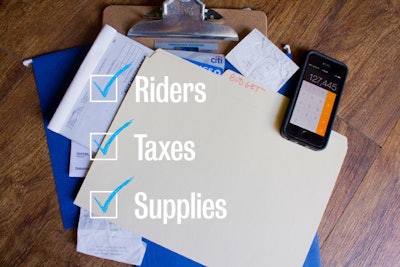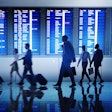
From audiovisual costs to dietary restrictions, here are eight event budget factors to consider so you won't be surprised by those hidden charges.
1. What’s in those riders?
“Technical riders can be an item that sneaks up on you,” says Debbie Purcell, signature events manager at Chicago’s Make-A-Wish Illinois. Especially when it comes to celebrities or musical acts, these costs can be significant. Purcell says that when her group started using name acts, it was caught by surprise. “We had to spend about $12,000 for lighting and technology we didn’t know about.”
2. What are you feeding your staff?
“In all likelihood these people will be on site for six to eight hours including event time, and you’ll need to feed them,” points out Howard Givner, founder and executive director of the New York-based Event Leadership Institute. The same holds true for vendors, he adds. True, they could fend for themselves, but then they’d be spending valuable time off site. “You want them eating on site where you can find them if you have a question about something,” Givner says.
3. What are the rates for sales tax and service charges?
“Only certain budget line items will have tax applied, and some vendors won’t calculate tax until the order is confirmed,” says Lauren Hurley, senior event producer at the Visionary Group in Los Angeles. In addition, service charges and gratuities might not be included in a quote. “Ask if there will be any additional charges for delivery, pickup, or other miscellaneous fees that aren’t included in the initial quote,” she says.
4. What audiovisual equipment and labor is included, if any?
“Don’t ever assume anything about audiovisual costs, because every venue and every company is different,” says Todd Hawkins, president of Los Angeles-based The Todd Group. “The technology and the terminology changes so often, you can get these really complex estimates,” he says, and don’t be afraid to ask for clarification if an item or term is unfamiliar. “Be very specific and request an itemized invoice.”
5. Will we have to provide security?
For events—especially at galleries or private estates—the contract might require security. “It can be from anywhere from $50 to $75 per guard with a four-hour minimum,” says Nancy Shaffer, founder and C.E.O. of Bravo in Washington. For a 500-guest event, three or four guards might be required. “And sometimes, when the venue offers the service, they also mark it up,” Shaffer warns.
6. What about a fire marshal?
“A fire marshal’s invoice for services can come as a surprise to the client long after the event is over because it can sometimes take a while for the city or state to invoice the venue,” says Christina Sion, vice president of food and event services at the California Science Center. If the topic wasn’t addressed in advance and the venue didn’t agree to absorb the cost, you could wind up on the hook.
7. Where are my office supplies?
Binder clips, printer ink, and notepads might only be a couple hundred dollars, but if you forget to have them on site, the cost in terms of money as well as hassle factor can escalate. “It could be a major expense,” Hawkins warns. “The reason being, you might not realize this until a very late hour and may be left having to resort to a business center on property, and the upcharge on resources there is astronomical.”
8. How many attendees have dietary restrictions?
“Dietary restrictions seem to be coming a bit of a bigger issue,” Purcell says. “What I’ve seen lately is more and more people are vegan or have gone gluten-free,” she says, and catering to those dietary preferences can be costly, since her group doesn’t require people who need special meals to request one in advance. “We have to actually pay for those extra dishes. It does force us to buy extra plates that don’t even get served.”



















